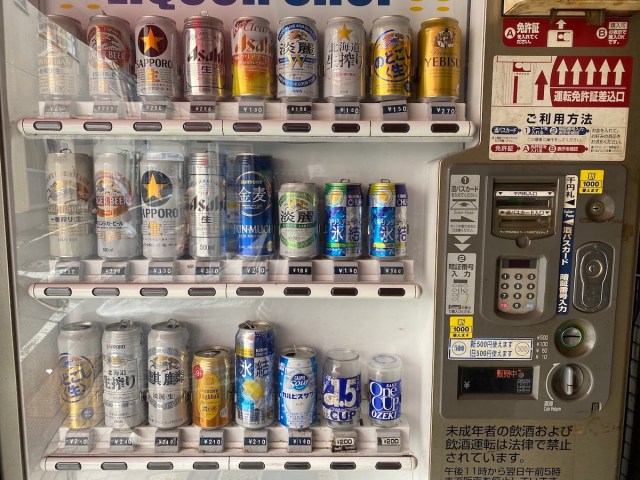
Remnants of a bygone era reveal the quirks of a previous payment system.
Japan is well-known for having vending machines on practically every other corner, providing people with a range of hot and cold beverages to choose from at any time of the day or night.
For those wanting an alcoholic form of refreshment, there are vending machines that provide that too, and while they’re not as ubiquitous as their non-alcoholic counterparts, they’re often found outside small liquor stores, standing as a testament to time with an old, weatherworn look.
What these ageing machines lack in modern looks they make up for in nostalgia, warming the hearts of people like our Japanese language reporter Takashi Harada, who’s always had a fondness for them. However, Takashi’s interest in these machines extends beyond their worn appearance because he’s always been keen to solve one of the mysteries connected to them.
You see, when you look closely at one of these machines, you’ll find there are three ways to operate it. You can either put your driver’s license into the slot marked in red near the top of the machine to verify your age, and then insert coins or cash into the slots marked out in blue, or you could use something called a “Sake Pass Card”.
▼ The slot for the “Sake-Pass” (sake is used as a blanket term for all types of alcoholic beverages in Japan) is written in Japanese and English on the machine.
Takashi recently came across one of these machines outside a small liquor store, and when he saw it had a slot for the sake pass card, he wanted to talk to the owner about it. Unfortunately, it was a public holiday so the store was closed, and after going home to search the Internet for more information about the card, he found that very little was known or written about it.
What he was able to gather from his research was that the card could be used by people who didn’t own a driver’s license as a way to verify their age. Once it was inserted into the machine, the user would have to enter their personal identification number on the keypad before being able to select and pay for their purchase.
These days, it’s common for people to use a similar style of I.D. card called “Taspo” (once known as “Tobacco Card”) to buy cigarettes at vending machines in Japan, but Takashi had never met anyone with a “Sake-Pass” before. The lack of information about them and the fact that a lot of people in Japan had never seen one had Takashi’s curiosity piqued; owning a Sake Pass became one of Takashi’s new life goals.
He returned to the store when they were open so he could speak with someone who worked there. As luck would have it, the woman he ended up speaking to had been working there for a considerably long time so she could give him — and us — a bit of an insight into the mysterious Sake Pass.
Let’s take a look at their discussion below.
Takashi: “Excuse me – I’d like a Sake Pass card, is it possible to get one?”
Store clerk: “Sorry, what’s that? What do you mean?”
Takashi: “It’s a card written on the alcohol vending machine; does it still exist?”
Store clerk: “Oh, that’s right. The card reader is broken and can’t be used. Right now, you can just use regular money to buy things at the machine.”
Takashi: “Oh, it’s that style” (At this point he laughed nervously, hoping she wouldn’t think he was weird for being so interested in the Sake Pass)
Store clerk: “Yes – that’s how it works.”
Takashi: “By the way, is it not possible to get a Sake Pass anymore?”
Store clerk: “We’ve never used one. I think they’ve disappeared; it’s a very old machine.”
Takashi: “Just to be specific, how many years ago was it installed?”
Store clerk: “Well, it was a long time ago, maybe 15 to 20 years ago.”
Takashi: “Oh I see – that’s quite a while ago! But at that time you could buy things from the machine with a Sake Pass, right?”
Store clerk: “Yes, however…“
Takashi: “However…?”
Takashi now gulped in anticipation, hoping she would drop some important insider information
Store clerk: “The slots for 1,000-yen (US$9.11) bills and the Sake Pass card are close to each other so there were quite a few people who put the card in the wrong slot by mistake. I remember that well.”
Takashi: “Did the machine take the card even if it was in the wrong slot?”
Store clerk: “That’s right. I had to call the maker each time and I couldn’t get it out; it was hard work.”
Takashi: “So such an era existed. Can this Sake Pass card be found all over the country?”
Store clerk: “As far as I know, they don’t exist anymore.”
Takashi: “While we’re on the topic, alcohol vending machines are also pretty rare. Are they becoming fewer nationwide?”
Store clerk: “There aren’t many of them around. The one we have is old so I wonder how much longer we can use it for. But we’ll use it for as long as we can.”
Takashi thanked the lady for sharing such useful information with him and helping to shed some light on the phantom Sake Pass. While he was happy he could learn a bit about the card, he can’t deny he felt a little down after coming to the realisation that he may never get his hands on one of these mysterious passes.
While he yearned for a time gone by when Sake Pass cards still existed, he decided to be grateful instead that these machines even exist today at all, complete with the now-defunct payment system attached. For now, though, the Sake Pass remains a phantom. If you own one, hopefully one day Takashi will be able to run into you…and solve the mystery of what they looked like once and for all!
Photos ©SoraNews24
● Want to hear about SoraNews24’s latest articles as soon as they’re published? Follow us on Facebook and Twitter!
[ Read in Japanese ]

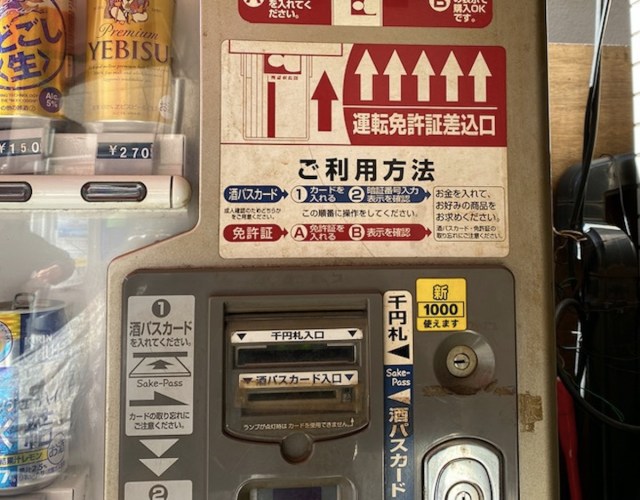
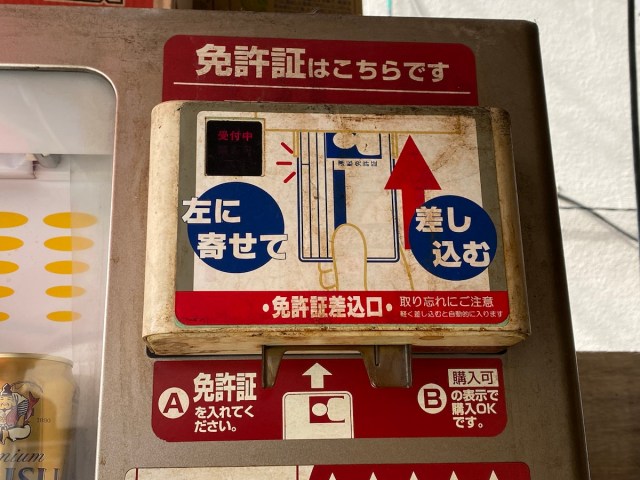
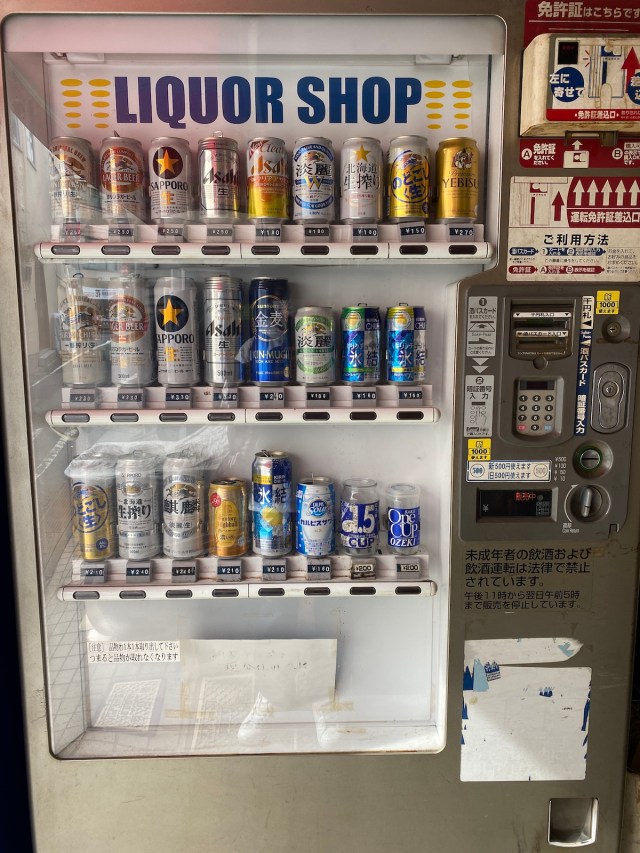
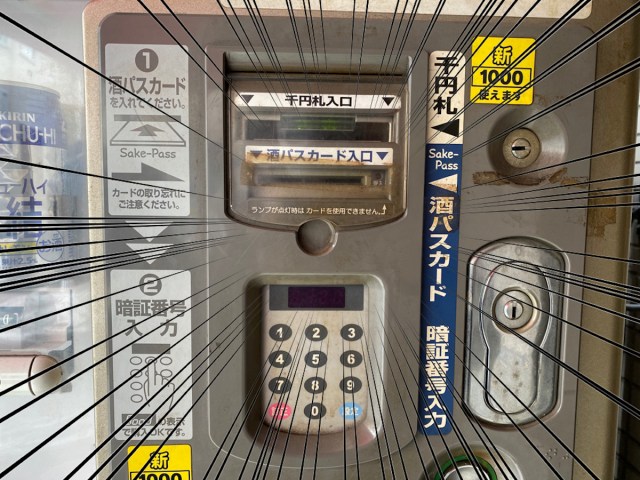
 Mysterious eyes found in Japanese vending machine coin slot
Mysterious eyes found in Japanese vending machine coin slot Japanese vending machine is the only one of its kind in Japan, dubbed the “phantom machine”
Japanese vending machine is the only one of its kind in Japan, dubbed the “phantom machine” Japanese reporter visits ice cream vending machine… at Walmart!?
Japanese reporter visits ice cream vending machine… at Walmart!? Japan’s most mysterious vending machine sells fukubako, boxes filled with…something【Photos】
Japan’s most mysterious vending machine sells fukubako, boxes filled with…something【Photos】 We splurge at the new Blue Bottle Coffee vending machines in Tokyo
We splurge at the new Blue Bottle Coffee vending machines in Tokyo Is Sapporio’s Snow Festival awesome enough to be worth visiting even if you hate the snow? [Pics]
Is Sapporio’s Snow Festival awesome enough to be worth visiting even if you hate the snow? [Pics] Shibuya Station’s Hachiko Gate and Yamanote Line stairway locations change next month
Shibuya Station’s Hachiko Gate and Yamanote Line stairway locations change next month The 10 most annoying things foreign tourists do on Japanese trains, according to locals
The 10 most annoying things foreign tourists do on Japanese trains, according to locals 566 million yen in gold bars donated to Japanese city’s water bureau
566 million yen in gold bars donated to Japanese city’s water bureau Is China’s don’t-go-to-Japan warning affecting tourist crowds in Shibuya’s Don Quijote?
Is China’s don’t-go-to-Japan warning affecting tourist crowds in Shibuya’s Don Quijote? Japan just had its first same-month foreign tourist decrease in four years
Japan just had its first same-month foreign tourist decrease in four years This overlooked neighborhood east of Tokyo is awesome in many ways, left us with just one regret
This overlooked neighborhood east of Tokyo is awesome in many ways, left us with just one regret Japanese potato chip Rubik’s Cubes coming soon
Japanese potato chip Rubik’s Cubes coming soon What makes this new Japanese convenience store chain better than 7-Eleven?
What makes this new Japanese convenience store chain better than 7-Eleven? Japanese prison will become luxury hotel managed by country’s premier resort company
Japanese prison will become luxury hotel managed by country’s premier resort company Starbucks Japan releases new sakura goods and drinkware for cherry blossom season 2026
Starbucks Japan releases new sakura goods and drinkware for cherry blossom season 2026 Super-salty pizza sends six kids to the hospital in Japan, linguistics blamed
Super-salty pizza sends six kids to the hospital in Japan, linguistics blamed Foreign tourists in Japan will get free Shinkansen tickets to promote regional tourism
Foreign tourists in Japan will get free Shinkansen tickets to promote regional tourism Starbucks Japan unveils new sakura Frappuccino for cherry blossom season 2026
Starbucks Japan unveils new sakura Frappuccino for cherry blossom season 2026 Naruto and Converse team up for new line of shinobi sneakers[Photos]
Naruto and Converse team up for new line of shinobi sneakers[Photos] Now is the time to visit one of Tokyo’s best off-the-beaten-path plum blossom gardens
Now is the time to visit one of Tokyo’s best off-the-beaten-path plum blossom gardens Japan has trams that say “sorry” while they ride around town…but why?
Japan has trams that say “sorry” while they ride around town…but why? Sakura Totoro is here to get spring started early with adorable pouches and plushies
Sakura Totoro is here to get spring started early with adorable pouches and plushies Japan’s newest Shinkansen has no seats…or passengers [Video]
Japan’s newest Shinkansen has no seats…or passengers [Video] Foreigners accounting for over 80 percent of off-course skiers needing rescue in Japan’s Hokkaido
Foreigners accounting for over 80 percent of off-course skiers needing rescue in Japan’s Hokkaido Archfiend Hello Kitty appears as Sanrio launches new team-up with Yu-Gi-Oh【Pics】
Archfiend Hello Kitty appears as Sanrio launches new team-up with Yu-Gi-Oh【Pics】 Take a trip to Japan’s Dododo Land, the most irritating place on Earth
Take a trip to Japan’s Dododo Land, the most irritating place on Earth China’s don’t-go-to-Japan warning looks to be affecting tourist crowds on Miyajima
China’s don’t-go-to-Japan warning looks to be affecting tourist crowds on Miyajima Survey asks foreign tourists what bothered them in Japan, more than half gave same answer
Survey asks foreign tourists what bothered them in Japan, more than half gave same answer Japan’s human washing machines will go on sale to general public, demos to be held in Tokyo
Japan’s human washing machines will go on sale to general public, demos to be held in Tokyo Starbucks Japan releases new drinkware and goods for Valentine’s Day
Starbucks Japan releases new drinkware and goods for Valentine’s Day We deeply regret going into this tunnel on our walk in the mountains of Japan
We deeply regret going into this tunnel on our walk in the mountains of Japan Studio Ghibli releases Kodama forest spirits from Princess Mononoke to light up your home
Studio Ghibli releases Kodama forest spirits from Princess Mononoke to light up your home Major Japanese hotel chain says reservations via overseas booking sites may not be valid
Major Japanese hotel chain says reservations via overseas booking sites may not be valid Put sesame oil in your coffee? Japanese maker says it’s the best way to start your day【Taste test】
Put sesame oil in your coffee? Japanese maker says it’s the best way to start your day【Taste test】 No more using real katana for tourism activities, Japan’s National Police Agency says
No more using real katana for tourism activities, Japan’s National Police Agency says Here’s where to find possibly Japan’s cheapest, most mysterious vending machine
Here’s where to find possibly Japan’s cheapest, most mysterious vending machine Forget panty vending machines – BOGOF canned coffee is all the excitement we need!
Forget panty vending machines – BOGOF canned coffee is all the excitement we need! This may look like an ordinary vending machine from afar, but it’s a different picture up close
This may look like an ordinary vending machine from afar, but it’s a different picture up close Japan’s vending machines are no match for counterfeit coins
Japan’s vending machines are no match for counterfeit coins Hoisu: The phantom Japanese sake that can’t be purchased in stores
Hoisu: The phantom Japanese sake that can’t be purchased in stores Should you trust these suspicious-looking Japanese vending machines?
Should you trust these suspicious-looking Japanese vending machines? Will we win a 75,000-yen tub of caviar from this Japanese vending machine?
Will we win a 75,000-yen tub of caviar from this Japanese vending machine? Ramen vending machine brings a new noodle stand experience to Tokyo station
Ramen vending machine brings a new noodle stand experience to Tokyo station Gekkeikan releases new alcohol-free Japanese daiginjo sake
Gekkeikan releases new alcohol-free Japanese daiginjo sake Thirsty buyer trolled by Japanese “mystery” vending machine, gets a liquid, but not one to drink
Thirsty buyer trolled by Japanese “mystery” vending machine, gets a liquid, but not one to drink The sad story of the Japanese vending machine set to disappear at the end of the year
The sad story of the Japanese vending machine set to disappear at the end of the year Japanese vending machines now sell pearl jewellery
Japanese vending machines now sell pearl jewellery Company president motivates employees via vending machine with personalised messages
Company president motivates employees via vending machine with personalised messages “Why Japan has so many vending machines” video makes some good points, but misses key factors
“Why Japan has so many vending machines” video makes some good points, but misses key factors Kyoto Mystery Spot: vending machine near one of Kyoto’s oldest temples sells what?! 【Photos】
Kyoto Mystery Spot: vending machine near one of Kyoto’s oldest temples sells what?! 【Photos】 A Japanese vending machine perfect for samurai
A Japanese vending machine perfect for samurai Japanese vending machine dispenses ultra-rare gold Coca Cola can prize
Japanese vending machine dispenses ultra-rare gold Coca Cola can prize